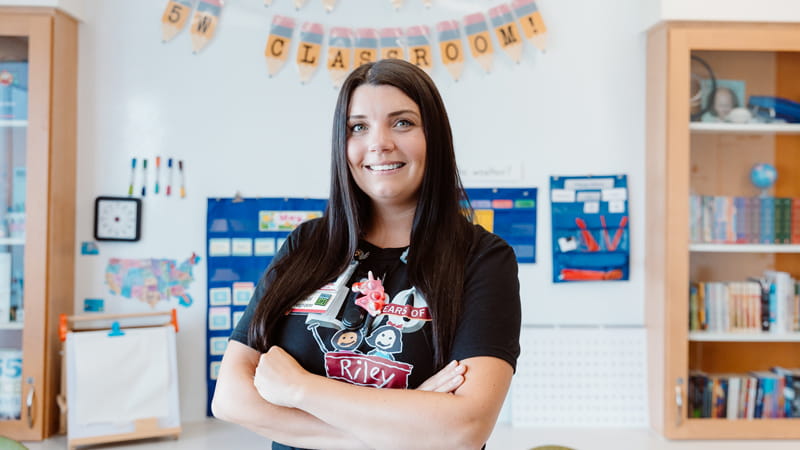When 12-year-old Bolton was admitted to Riley Children’s Health for a stem cell transplant, his family prepared themselves for months of medical procedures and missed school.
Their concerns were eased when they learned about the Riley School Program, an initiative that helps children in the hospital with K-12 schoolwork and keeps them on a path of academic progress.
Through the program, Riley Children’s educational liaisons teach and advocate for the patients’ academic needs.
Kristin Lile was Bolton’s teacher. She always knew she wanted to be an educator, and when she joined the program nine years ago, it was a perfect fit.
“I knew I wanted to work with children with unique needs to be able to advocate for them,” Lile said. “As soon as I started here, I immediately knew this is where I want to be. Our teams encourage kids to do classwork, so they can stay on track with their peers and have those moments back at school with their friends.”
Bridging the gap
Lile and 10 other licensed educators, instructional assistants, managers, and a team of volunteers work with nearly 1,000 patients’ medical teams and schools to maintain a sense of normalcy and ensure an appropriate education plan is in place throughout their stay, treatment, and long-term needs.
For some children, this is one-on-one instruction when clinically determined necessary. Others whose diagnoses allow them to be around other patients may learn in a colorful classroom within the hospital.
Each educator works closely with schools to coordinate assignments while children are hospitalized and create tailored learning plans for each student.
“Our medical teams take time to explain the diagnosis and treatment to us so we can learn, ask questions, and be ready to explain it to schools,” Lile said. “We are that bridge between health care and education, so we can share information in a way schools can understand.”

During Bolton's seven-month stay, he met with Lile every day to stay on track in reading, math, science, and more.
Some days, he had enough energy for 15 minutes of work. On better days, they could focus on his favorite subject and solve math problems together.
“I could tell there were days he did not want to learn, but he showed up every day with a smile on his face,” Lile said. “So sometimes, I was just being a friend. But when he was feeling better and was ready to start doing school together, that was an exciting conversation.”
Being a liaison
Another part of Lile’s job is to make sure parents can focus on their children’s health journey, and not on calling the school or completing paperwork.
For Bolton’s mom, the school program provided peace of mind. Lile talked with her to address concerns and discussed options to keep Bolton from falling behind.
“I can take that burden off the parents of having to talk to the school,” Lile said. “I was contacting the school to address her concerns, making sure she understood all the different ways school could look, and reassuring her that if we need to pause school, Bolton can still graduate one day.”
Educators also help parents provide medical documentation for accommodations that will impact a child’s school plan, including homebound education applications, 504 plan recommendations, and Individualized Education Plan guidance.
Helping beyond academics
The hospital-based school program offers more than just academic benefits. Research shows that lessons can lead to increased positive emotions in hospitalized children and reduced anxiety and depression.
Educators don’t just teach; they serve as cheerleaders and friends for patients and families.
When Bolton was having a tough day, Lile would spend time with him playing games. They’d sit together in the hospital library and Bolton would find medical words on books for Lile to figure out during a game of Build-a-Man.
They’d also talk about upcoming medical appointments that made him especially nervous and what was going on in his medical journey.
“I was able to just be his cheerleader,” Lile said. “We celebrated milestones together. I watched him show resilience through really hard situations, and it was motivating and inspiring every day.”
Riley Children’s support services like music, art, and pet therapy also support patients and families during their stay.
Reaching their goals
Not long ago, Lile ran into Bolton in the hallway. The boy she remembered as a bright student was now taller, a young man who is back at school and doing well.
Stories like his are reminders that the school health programs at children’s hospitals are more than coordinating assignments. They are about ensuring children don’t feel left behind — so they can go back home to their friends and families and still walk across the stage to receive their diploma.
“A child’s medical diagnosis is our first priority, but everyone at Riley values school,” Lile said. “We want our patients to be a kid, be a student, finish their education, and reach their goals.”


